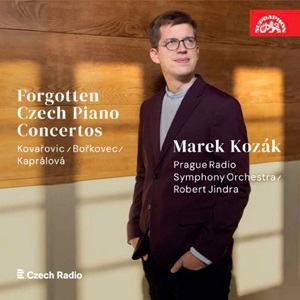
Forgotten Czech Piano Concertos
Karel Kovařovic (1862-1920)
Piano Concerto in F minor, Op 6 (1887)
Vítězslava Kaprálová (1915-1940)
Piano Concerto in D minor, Op 7 (1935)
Pavel Bořkovec (1894-1972)
Piano Concerto No 2 (1949)
Marek Kozák (piano)
Prague Radio Symphony Orchestra / Robert Jindra
rec. 2020 (Kaprálová), 2022 (Kovařovic & Bořkovec), Studio 1 of Czech Radio, Prague
Supraphon SU 4337-2 [75]
I’d say only two of the concertos in Supraphon’s disc are ‘forgotten’ so let’s start with the one that’s remembered, Vítězslava Kaprálová’s Piano Concerto of 1935. The opening movement was performed at her graduation ceremony, played by Ludvík Kundera – Milan Kundera’s father – with Kaprálová herself conducting. It must have made quite an appeal to the senses as it’s full of florid romanticism, dappled piano writing and laden with virtuoso runs. The central movement is exceptionally brief, limpid and polyphonic, and prefaces an attaca into the finale, which is much more percussive, free-flowing and encodes a jazzy ostinato figure. A reflective panel offers contrast before the extrovert final flourishes. The wind writing is vivid and the orchestration pert and even chic. The young pianist Marek Kozák is on a par with the soloist on Naxos’s all-Kaprálová disc, Amy I-Lin Cheng, and their tempo decisions are similar, though Kozák has by far the better orchestral accompaniment. A trickier disc to find offers much stiffer opposition – Alice Rajnohová with Tomáš Hanus and the Bohuslav Martinů Philharmonic on Radioservis. They are swifter throughout and bring a greater sense of daredevilry than their rivals.
Where Kozák scores highly is in the companion works, which really do deserve the ‘forgotten’ tag. Sometimes a forgotten concerto is forgotten for good reason, but not in the case of those by Karel Kovařovic and Pavel Bořkovec. Kovařovic’s concerto would have fitted neatly into Hyperion’s Romantic Concerto marque. It dates from 1887, is in three movements, and when it was finally premiered in 1893 received lavish praise from Josef Bohuslav Foerster as did the soloist, 21-year-old Vilém Kurz, who was soon to revise Dvořák’s Piano Concerto. Kovařovic did compose but was better known as an opera conductor, so the Concerto is somewhat anomalous. Perhaps that accounts for its strikingly personal, conversational qualities – the piano enters immediately and then oscillates between the poetic and the stormy, between the luminous and the ultra-busy. There’s an extensive cadenza in the opening movement. Foerster was right when he characterised the central movement as ‘graceful’; there are profuse rolled chords, some – perhaps – more florid than dramatically necessary, functioning more as decorative filigree than anything else but the writing is so charming you are inclined to be swept away by it all. With its terpsichorean energy, the finale is marked by the piano and then the orchestra alternately leading the dance. The music is strongly accented and athletically attractive. This is a wide-ranging concerto, unaccountably overlooked. It was recorded for the radio by Zdeněk Jílek with the same orchestra as plays here, directed by Josef Hrncir. It’s available on YouTube.
Pavel Bořkovec was born the year after Kovařovic’s Concerto was premiered and he studied with Foerster, who had perceptively seen the work’s salient features. Bořkovec also studied with Jaroslav Křička and, when he was nearly 30, Josef Suk. His Concerto No 2 – the First has received commercial release – dates from 1949 and is motorically obsessive, generating a percussive dynamism that takes crispness to a new level, though it’s cannily interspersed with slower material. This level of kinetic intensity also suffuses the slow movement, though it does fall away toward the end, before resuming once more for the finale. The wind lines are bracing and an element of neo-classicism seeps into the writing as well as his ‘dissonant counterpoint’. The overriding impression of the finale is its clarity, though, and its heritage rooted in Stravinsky and Hindemith. For a study in rhythm and clarity, it could hardly be bettered. You can also find a recording with Antonin Jemelik and the Czech Philharmonic Orchestra under Karel Ancerl in the ‘Ancerl Gold’ series. It’s volume 30 and they prove the more incisive interpreters. The Czech Phil’s sonority is distinctive and clarifies the writing, and Jemelik accents more dramatically, vesting the piano writing with a real sense of anticipation.
This is a good collection of three Czech concertos and if I favour other performances that doesn’t lessen its attractive qualities. The orchestra plays with sensitivity though without perhaps the necessary level of weight for the Kovařovic and Robert Jindra directs well though I rather wish he’d been more dynamic in the Bořkovec. The notes are good, as is the recording – once I’d dismissed my fear that the balance favoured the piano.
Jonathan Woolf
Help us financially by purchasing from




















